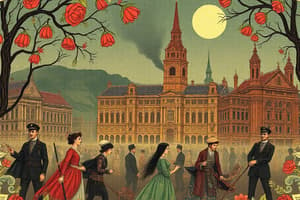Podcast
Questions and Answers
On May 7th, 1945, Germany unconditionally surrendered, while Japan capitulated just three months later following nuclear attacks on ______ and Nagasaki
On May 7th, 1945, Germany unconditionally surrendered, while Japan capitulated just three months later following nuclear attacks on ______ and Nagasaki
Hiroshima
World War II commenced in September 1939 when Nazi Germany attacked ______
World War II commenced in September 1939 when Nazi Germany attacked ______
Poland
World War I laid bare the futility of total warfare, leading to a resurgence in pacifistic sentiments, particularly in Western Europe, where widespread disillusionment gave rise to communism, fascism, and other radical ______
World War I laid bare the futility of total warfare, leading to a resurgence in pacifistic sentiments, particularly in Western Europe, where widespread disillusionment gave rise to communism, fascism, and other radical ______
ideologies
World War II marked the definitive end of colonial empires, with decolonization efforts emerging throughout Asia, Africa, and the ______ East
World War II marked the definitive end of colonial empires, with decolonization efforts emerging throughout Asia, Africa, and the ______ East
Furthermore, the postwar period produced the United Nations, NATO, and other international organizations designed to promote ______ and stability
Furthermore, the postwar period produced the United Nations, NATO, and other international organizations designed to promote ______ and stability
Flashcards are hidden until you start studying
Study Notes
Unraveling History's Tangled Threads: A Survey of World War Eras
From the cataclysmic upheavals of the 20th century come two pivotal events – World War I and II – that have profoundly shaped our modern world. Let us delve into their origins, timelines, and consequences with an objective lens, exploring these tumultuous chapters as they unfolded across continents and decades.
Origins and Background
World War I, also known as the Great War, originated from a complex web of tensions between European powers. Imperial rivalries, alliances, nationalism, and militarism were among the driving forces behind this conflict that lasted from July 1914 until November 1918.
The roots of World War II can be traced back to the Treaty of Versailles, which ended WWI, and its failure to address underlying ethnic, political, and economic issues. As Europe reeled from depression and fascist ideologies rose amidst political instability, Germany invaded Poland in September 1939, igniting another global conflagration that would span nearly six years.
Timeline
-
World War I: Began in July 1914 with the assassination of Archduke Franz Ferdinand by Serbian nationalists and swiftly escalated into a clash between the major powers of Europe: Austria-Hungary, Russia, Germany, France, and Britain. By August 1917, America entered the war after German submarines sank several U.S. vessels. Finally, Germany surrendered in November 1918.
-
World War II: Commenced in September 1939 when Nazi Germany attacked Poland; however, it was officially declared by Prime Minister Neville Chamberlain in Britain on September 3rd, 1939. Allied nations joined the fight against the Axis Powers, led predominantly by Germany, Italy, and Japan. On May 7th, 1945, Germany unconditionally surrendered, while Japan capitulated just three months later following nuclear attacks on Hiroshima and Nagasaki.
Consequences
Both wars resulted in immense loss of life, far-reaching social changes, and geopolitical shifts:
-
World War I laid bare the futility of total warfare, leading to a resurgence in pacifistic sentiments, particularly in Western Europe, where widespread disillusionment gave rise to communism, fascism, and other radical ideologies. It also precipitated a cultural shift towards equality between men and women through female suffrage movements.
-
World War II marked the definitive end of colonial empires, with decolonization efforts emerging throughout Asia, Africa, and the Middle East. Furthermore, the postwar period produced the United Nations, NATO, and other international organizations designed to promote peace and stability.
In hindsight, these conflicts represent more than mere historical milestones—they serve as vivid reminders of humanity’s capacity for both strength and suffering—and the ever-present need for cooperation, diplomacy, and vigilance in a constantly evolving world.
Studying That Suits You
Use AI to generate personalized quizzes and flashcards to suit your learning preferences.




